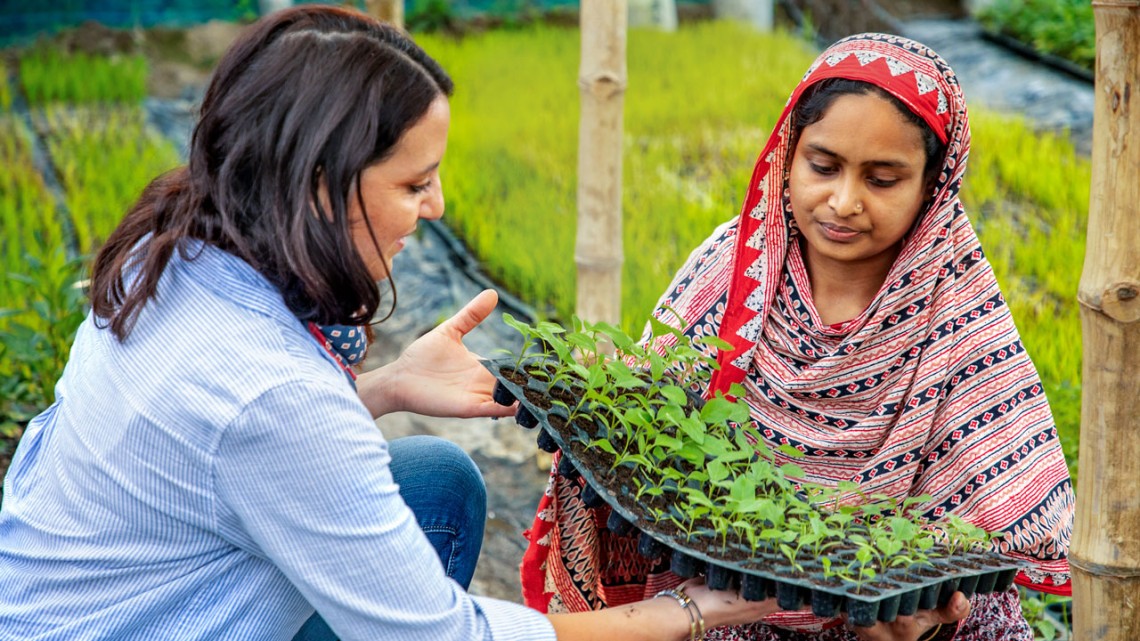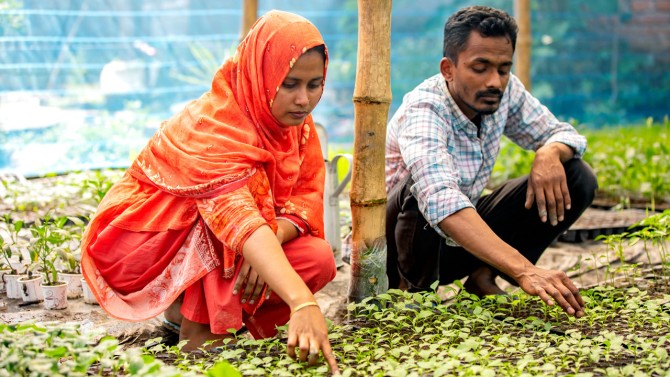
Maricelis Acevedo, left, with an entrepreneur in her plant nursery established with the support of the Feed the Future Insect-Resistant Eggplant Partnership.
Women entrepreneurs grow resources in Bangladesh
By Matt Hayes
In her remote village in Bangladesh, Moushumi Akhter provides childcare for neighborhood kids. She relishes nurturing children, but being a mother and teacher left her little opportunity to take an assertive role in her family finances.
That changed with the construction of a plant nursery in March 2022 on land behind her small stone house. Nestled among the rows of vegetables in her family garden, the nursery is providing Akhter a chance to grow in new ways: as an entrepreneur in control of her own finances while selling seedlings of Bt eggplant and other crops to local farmers and neighbors.
“I have earned a profit by selling Bt brinjal seedlings, and as a result, I have achieved self-dependence,” said Akhter, 29. “With the extra income I earn, I am able to provide my children with financial support and enroll them in better schools.”
Akhter is a participant in an initiative by the Feed the Future Insect-Resistant Eggplant Partnership (IREP) to support women entrepreneurs, which is pioneering plant nurseries as a catalytic resource for food and economic security in the country. Farmers in Bangladesh rely on nurseries to build flexibility into their cropping seasonal planning and deal with unpredictable rains. The nurseries are part of an IREP effort to increase access to Bt eggplant, a USAID-supported biotechnology crop that improves the health and socio-economic well-being of farmers and protects the environment.
The plant nursery program is laying a pathway for improved social status of women and increased control over resources, said Maricelis Acevedo, IREP director and research professor in the College of Agriculture and Life Sciences.
“Women-led nurseries have demonstrated that income-generating activities can have a ripple effect in accelerating gender equality, enhancing women's capabilities and enabling them to make informed choices regarding their personal, social and financial well-being,” Acevedo said.
The project funded the establishment of bamboo-framed nurseries with protective netting and sheeting for 34 women entrepreneurs from the Bogura, Jashore, Joypurhat and Khulna districts of Bangladesh. Along with technical and entrepreneurship training, women receive farming inputs and money for seeds to manage their enterprises.
In 2022, the Feed the Future Insect-Resistant Eggplant Partnership conducted a feasibility study into the viability of plant nurseries to improve women’s participation and foster economic empowerment. The study indicated that plant nurseries offered women robust income-earning potential and diversified economic opportunities. And as seedling providers, the women entrepreneurs could establish a handhold on a critical link of the food security value chain.
IREP established the first 19 nurseries in late 2022, with project specialists offering training in crop loss mitigation, marketing strategies, efficient nursery management, and gender to ensure greater women participation.
Significantly, women gained insights into time management and leveraging their resources to diversify their income sources, said Raja Rajeswari, a gender specialist working on the project.
“Every woman entrepreneur learned that effective financial management, marketing, and producing high-quality seedlings are essential to the success of their businesses,” Rajeswari said.
The experience of the women in the program demonstrates what country-level data has consistently shown: Empowered women lift their families and communities. Individually, women who have control of their own money reinvest more into household nutrition, health and education than men do. Collectively, women are key to solving hunger: when allowed equal access to land and other inputs, their agricultural yields can increase by 20-30% – the equivalent of feeding up to 150 million more people globally, according to a United Nations Food and Agriculture Organization report.
As a day laborer, Mina Begum, 43, commuted two hours each way on an autorickshaw at a cost of 60 takas for an eight-hour shift that earned her 150 takas, and the seasonal employment left her jobless for some of the year. Once selected for the IREP program, she planted 20,000 seedlings and promoted her business through a door-to-door campaign.
Her marketing techniques proved successful, and she soon sold out of all of her seedlings. After three months running her nursery, she calculated that she only spent four hours per day on the business, leaving her time and money to focus on other ventures. She bought a chicken and a goat and plans to add more livestock and learn garment-making to earn extra income.
“I worked really hard as a plant nursery laborer for many years, taking care of my family. But then an amazing chance came along for me to start my own business. It changed everything and allowed me to support my family in ways I never imagined before, ” said Begum, a divorced mother and grandmother .
Women entrepreneurs including Akhter and Begum are now taking part in diversified economic opportunities within a critical link of the food security value chain, Acevedo said.
“Advancing gender equality and women’s empowerment is leading to transformations in global food systems,” Acevedo said. “The women taking the lead now in Bangladesh are creating a future where secure, sustainable and equitable food systems are the norm.”
Visit the Feed the Future website for the full story.
Matt Hayes is communications lead for the Feed the Future Insect-Resistant Eggplant Partnership in the College of Agriculture and Life Sciences.
Media Contact
Adam Allington
Get Cornell news delivered right to your inbox.
Subscribe

